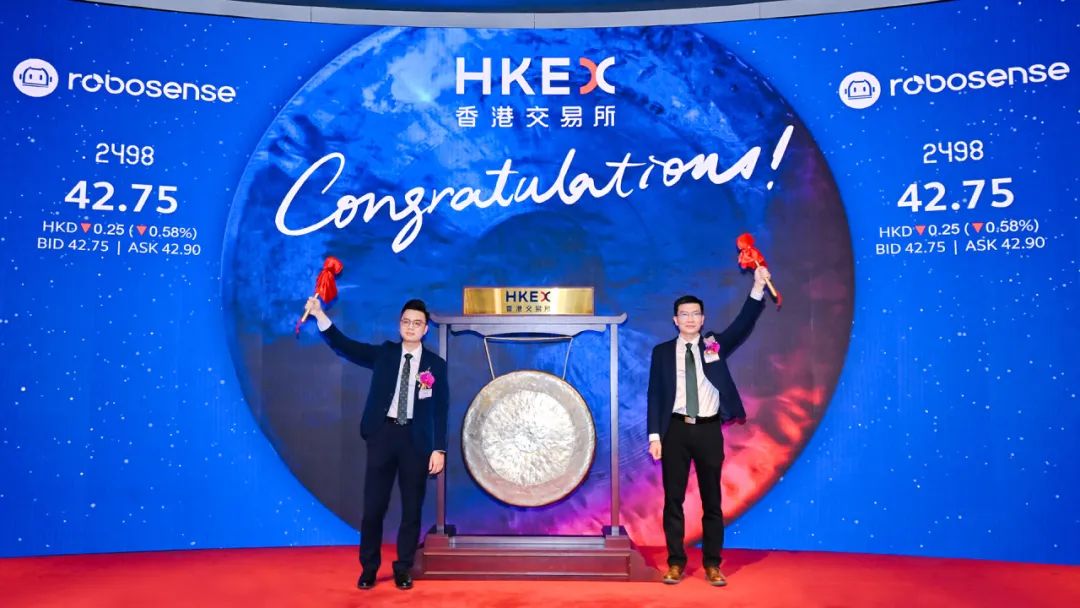HK’s first IPO of 2024 is a Nanshan-based LiDAR sensor maker
Source: Shenzhen DailyUpdated: 2024-01-10
RoboSense Technology, a developer of laser imaging, detection, and ranging (LiDAR) sensors for self-driving cars based in Nanshan District, becomes the first company to make an initial public offering (IPO) on the Hong Kong stock exchange this year.
Shares of the Shenzhen-based startup made their trading debut Friday last week after it raised HK$985.12 million (US$126.14 million) from its IPO by offering 22.91 million shares at HK$43 each.
However, the company’s stock lost as much as 3.5% before closing at HK$43 per share, unchanged from its offering price amid weak market sentiment which saw the benchmark Hang Seng Index fell 0.7% that day to cap the worst start to the year since 2005.
With a market capitalization of HK$19.3 billion on its first trading day, RoboSense is billed as the first-ever laser radar stock on the Hong Kong exchange and the world’s highest-valued laser radar company.
RoboSense plans to use 45% of the IPO proceeds on research and development and team expansion, 20% on enhancing its manufacturing, testing and verification capabilities, 20% on sales and marketing efforts, and the rest on general working capital and exploring potential strategic partnerships or alliance opportunities, according to its IPO prospectus.

Dr. Qiu Chunxin, co-founder, chairman of the board, executive director and CEO of RoboSense, and Qiu Chunchao, executive director of the company, ring the opening bell at the Hong Kong Stock Exchange on Jan. 5, 2024. Courtesy of Robosense
RoboSense, which counts tech giant Alibaba’s logistics arm Cainiao as its biggest pre-IPO shareholder with a stake of 10.46%, attracted Nanshan Strategic Emerging Industries Investment, owned by Nanshan’s district government, as its IPO cornerstone investor, which subscribed to 79.3% of the shares on offer at HK$781.2 million.
Founded in 2014, RoboSense specializes in providing laser radar and perception solutions, focusing on laser radar hardware and artificial intelligence perception software solutions that can be applied to autonomous driving and robotics.
The loss-making startup recorded a net loss of 244 million yuan (US$34 million) in the first six months in 2023 and a deficit of 563 million yuan in 2022.
“We are not able to predict when we will be able to start generating net profits and net operating cash inflow due to the fast-evolving business environment and competitive landscape,” it said in its prospectus.
RoboSense will focus on aggressive cost cutting to help hit its target to break even by 2025, according to executive director Qiu Chunchao, who spoke on “Bloomberg Markets: Asia.”
According to Qiu, the firm wants to reduce costs to US$100-US$200 per unit from about US$500.
The push for self-driving cars by the global car industry has created business opportunities for many companies along the chain, including makers of LiDAR sensors that bounce laser beams off objects to figure out their position in a three-dimensional space.
RoboSense’s prospectus shows that the firm posted a significant surge in laser radar shipments from 7,200 units in 2020 to 16,300 in 2021, swelling to 57,000 units in 2022. As of the end of October 2023, RoboSense had delivered around 220,000 lidar sensors.
The firm currently has more than 1,100 employees and owns more than 1,400 lidar-related patents as of December 2023, its website shows.
RoboSense has a strong customer base in automotive and robotics. As of Dec. 18, 2023, the firm has obtained orders from 21 auto suppliers and makers for 62 models, and successfully assisted customers in starting the large-scale mass production of 24 models.
 Copyright © Shenzhen Nanshan Information Network Center. All rights reserved.
Copyright © Shenzhen Nanshan Information Network Center. All rights reserved.



